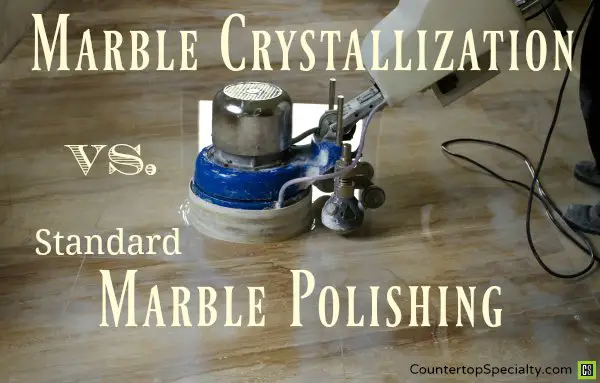Re-Crystallization vs. Standard Marble Polishing
QUESTION:
Are you familiar with the process of marbleizing / crystallizing for marble polishing?They've used it in Florida and Italy for over 20 years and it seems fabulous.
I had white marble in my kitchen in Florida (not something I would have considered on my own for the obvious reasons). They apply a chemical that bonds with the marble and creates a lustrous to shiny surface that is easily renewed.
If acid gets on the marble and marks it, you just buff on more chemical and voila, it's new again! I have no idea why other places don't use it. Susan - Phoenix, AZ.
ANSWER:
I can appreciate that you think recrystallization (also called vitrification) is fabulous. It makes the marble shiny and that's the homeowner's goal.Trouble is that most consumers are not aware of the pitfalls of marble crystallization compared to traditional marble polishing.
 |
Most people don't do it... and most pros don't like it because marble crystallization creates problems (sometimes expensive nightmare problems) not found with standard marble polishing. It's just an inferior method.
Here's why:
Crystallization can ruin your marble, it takes longer and costs more without ANY benefit over standard marble polishing.
It creates a problematic hard chemical shell on your marble trapping acids (used in the process) in the marble. It will make the marble shiny and it seems this is the "proof". But the shell also keeps the marble from breathing properly, which could lead to your marble simply falling apart.
So, understand once you crystallize you no longer have a "marble" surface. It becomes a "chemically manufactured" surface. Traditional, proven methods for marble cleaning, care and marble repair can no longer be used. You are stuck having to maintain the chemicalized surface.
Yes, it's been around for a while, but that doesn't make it good or beneficial. Agent Orange has been around a long time too.
The people that have it done simply don't know any better (no reason they or you should of course) and get sold by the sales pitch which seems fine and dandy.
Formula compatibility is a tricky problem.
Example: You have your marble, limestone, or travertine floor crystallized. Then a couple three years later when this chemical crust (that isn't as durable as marble) starts to look crappy, you have it recrystallized again only the first guy who did it is out of business or not available so you go with someone else who uses a different formula.
Well...
Proponents of the procedure and the sales literature make it seem like it's the latest greatest thing, but the main reason they like it is because it requires very little experience or knowledge of marble.
Traditional marble polishing requires real skill, knowledge, and experience.... the art of a true craftsman.
Crystallization requires virtually no skill... no more than cleaning a carpet, so from a business standpoint, it's simply easier and cheaper to find/train technicians. So, marble crystallization is easier to perform.
But if they screw it up while recrystallizing.... your marble may be toast.
This will NEVER happen with standard marble polishing. You can always fix a mistake with re-polishing, you never change the chemical or physical nature of the stone, and it makes it nice and shiny too.
So ask yourself... do you want a craftsman who knows how to properly maintain your marble in optimum condition over its entire life.... or just anyone capable of pushing a machine around?
Also, if you etch polished marble... a normally re-finished marble... all you need to do is to properly apply a good marble polishing product like this ETCH REMOVER / Marble Polishing Paste and viola... it is gone... all shiny again. So, even on this point, there is no advantage to crystallization.
Marble slab factories don't use crystallization. So, if my arguments aren't enough to dissuade you from doing it again in your new home, then consider that no factory in the world uses recrystallization as a method to "polish" the stone.
They all use standard mechanical grinding, smoothing, and polishing to finish the surface and make the marble shiny. It's simply the best way.
Standard re-finishing / marble polishing provides "like new" results without any of the risks and problems associated with crystallization.
Plenty of stories and myths floating around about marble and natural stone care and repair are just bogus. It's unfortunate for consumers because it's only natural to think that anyone selling or installing marble ought to know what's right, but they often don't.
That's why I've written a comprehensive marble maintenance manual to debunk the myths and to teach consumers how to clean and maintain their marble the right way.
If you are interested in learning about simple proven solutions, what you should and shouldn't do, then check out Cleaning Marble Secrets.
Comments for Re-Crystallization vs. Standard Marble Polishing
|
||
|
||
|
||
|
||
|
||
|
||
|
||
|
||
|
||
|
||
|
||
|
||
|
||
|
||
|
||
|
||
|
||


